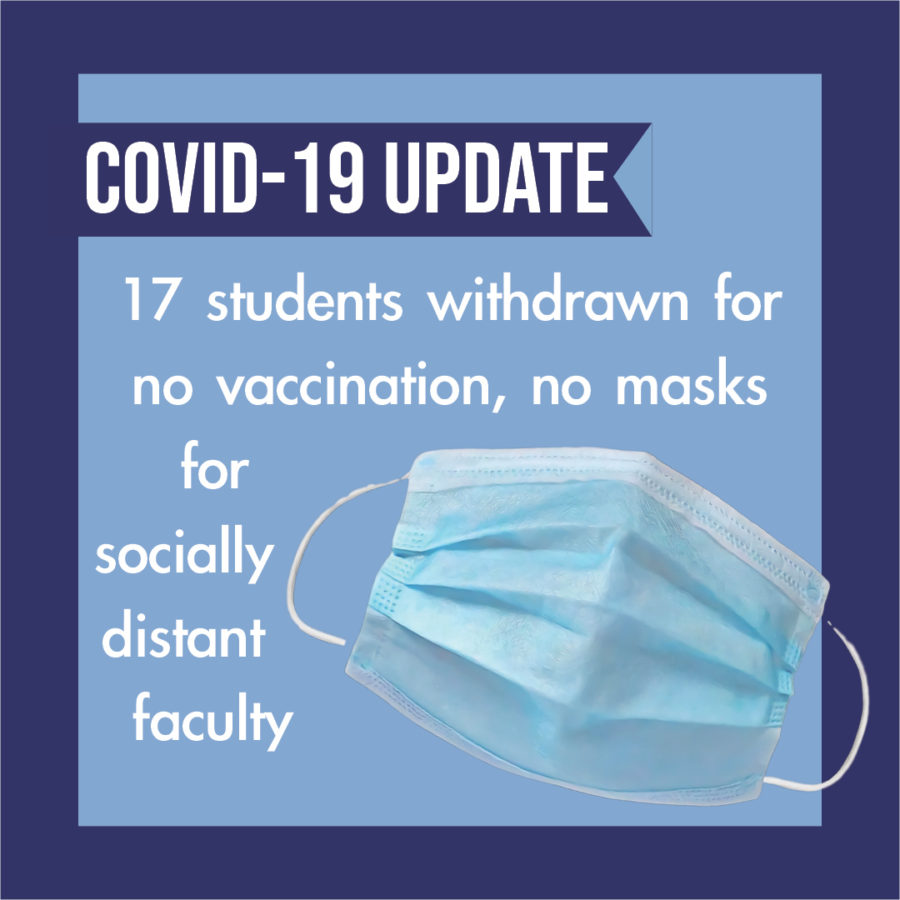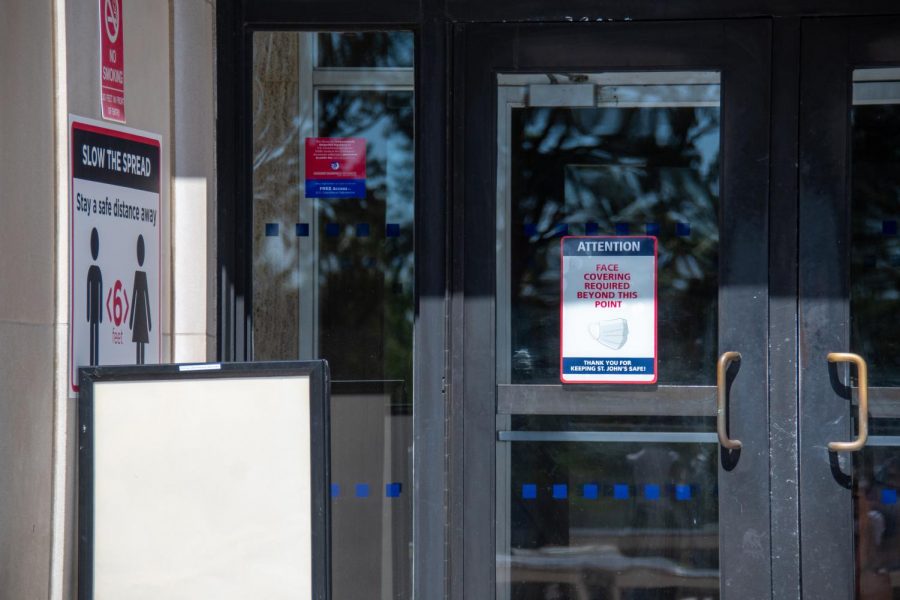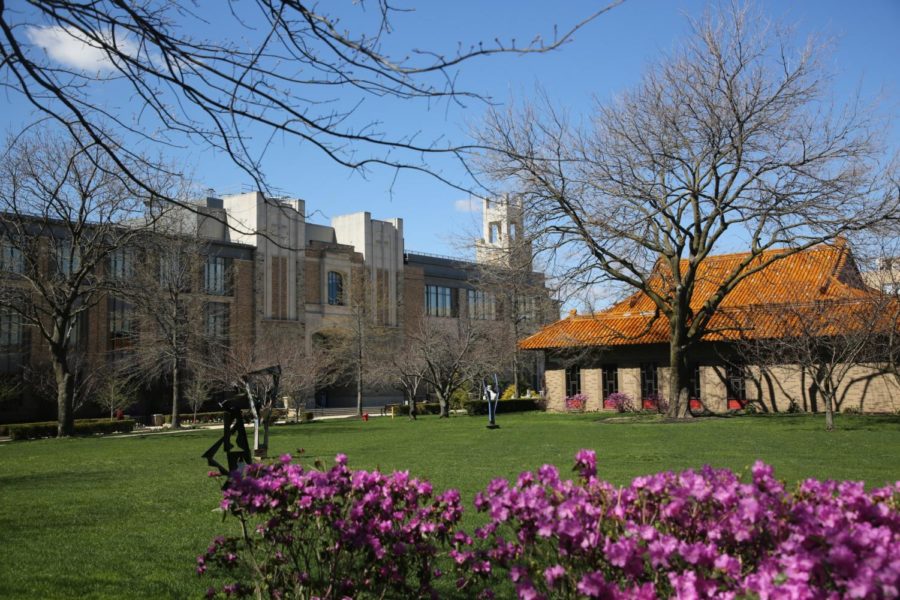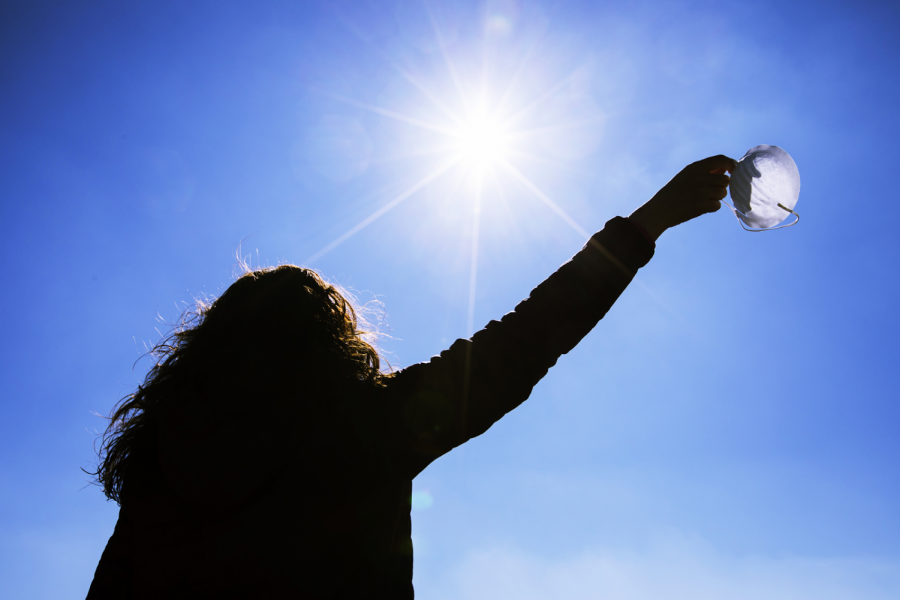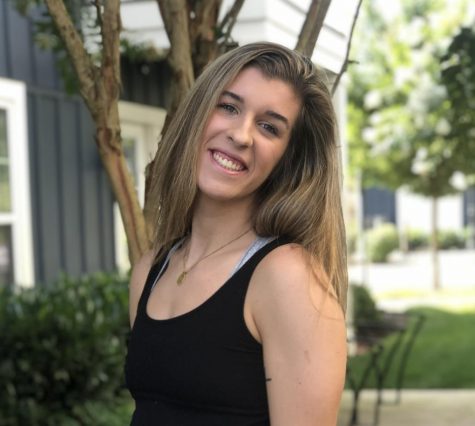COVID-19 has thrown students across the country for a loop. For St. John’s students, the pandemic quickly changed their spring semester and campus life following spring break. Students returned back to St. John’s from spring break between March 7-9. On March 9, a University-wide email was sent out that instructed all students to return home by Wednesday, March 11. Then on March 16, all students were informed that classes would be held online for the remainder of the semester. For some students traveling home was difficult, whether it involved them traveling out-of-state or even out of the country. For others, the shift to online classes was the main concern. As for the class of 2020, their final moments were taken in a blink of an eye.
To bring student experiences during this time to light, the Torch reached out to students to hear how COVID-19 affected their return home and how it is currently affecting their academic life.
 Christina Vaccaro, a sophomore at St. John’s, was studying abroad in Rome when COVID-19 hit. Vaccaro explained how the situation in Italy was slow at first, but then escalated quickly.
Christina Vaccaro, a sophomore at St. John’s, was studying abroad in Rome when COVID-19 hit. Vaccaro explained how the situation in Italy was slow at first, but then escalated quickly.
“It was crazy because I happened to be on a train ride back from Venice when they announced the outbreak in northern Italy. They started quarantining people and cancelled trains in parts of northern Italy including Venice probably not too long after I arrived back in Rome,” Vaccaro said. “It was absolutely insane how everything started to go downhill after that and how I happened to coincidently be in one of the places that it broke out in at the time.”
Vaccaro went on to explain the timeline of actions within Italy: “The Italian government declared a national state of emergency only a couple of days after the outbreak in northern Italy was announced. And each day it just kept getting worse and worse. Like I remember it jumped to a level four state of emergency within a week of the outbreak being announced.”
As the situation in Italy continued to escalate, the University advised students not to travel. At this time, Vaccaro was in Switzerland.
“My friends and I decided to travel anyway, even though we were warned not to. And then that weekend at like two in the morning on Saturday we received the email from the Queens campus global studies office that we were being sent home. My friend woke me up at 7:00 a.m. to tell me and I just remember crying and then panicking because we were in Switzerland.”
Then came the confusion. Thousands of questions, emails and calls with responses that left students more confused than they were to begin with. “The email the global studies office sent … just said that we were being sent home as soon as possible … our flight back to Rome was not until Sunday night,” Vaccaro said.
Her fellow students and friends had questions — from what time their flight back to the United States was to if they had to pay for the flight. “I heard most people’s concerns were answered with ‘I don’t know.’ I believe that the Queens campus pretty much had more of a say in the situation and that there seemed to be a lack of communication between the Queens and Rome campus faculty. I heard of a few students who received flight confirmations from the school and then got to the airport to find out that the school never paid for the flight,” she said.
Vaccaro was grateful that St. John’s paid for her plane ticket, but the path to get her itinerary and ticket was not worth the trouble.
“St. John’s failed to send me my flight information…I called the office that Monday night to ask them if they booked my flight, they said ‘yes’…then when I asked what time was my flight, they said ‘We cannot release that information right now’…I didn’t receive [the confirmation] until a whole hour later,” she recalled.
Vaccaro flew home on Wednesday, March 4 – she recalls that at this time there were a few thousand cases. Five days later, the nation went under lockdown with about 10,000 cases.
Soheila Shokraei, a sophomore who was also studying abroad in Rome, shared some of the same sentiments as Vaccaro. Shokareai thought that “St. John’s handled the situation with us sending home pretty well, except for the waiting game.”
”Honestly, I was bummed when I was told that I had to go home but at the same time I was glad that St. John’s made the decision for me so I didn’t have to,” Shokraei said. “It wasn’t how I thought the semester would go but there’s nothing that can be done to change it.”
Vaccaro says she returned home safely and went into a 14-day quarantine following her return. She is upset that the “best semester of her life” has now turned into the worst. She also wished that “global studies could have been a bit more professional and didn’t send emails with vague information when it comes to important things.”
As for students in Queens, she said, “I think it is kind of messed up that only a day after students returned from spring break, they announce that they are having online classes until the end of March and give students two days to go home after just returning. I think they could have been more considerate when making their decision because for resident students that don’t live close to campus, it is a hassle to go back home on such short notice, especially if they have to fly home.”
 Sophie Gable and Adelyn Corona, both sophomores, were participating in the St. John’s Western Europe program and were currently on their rotation in Limerick, Ireland. The situation in Ireland seemed to be a lot less extreme than the students in Rome had to endure.
Sophie Gable and Adelyn Corona, both sophomores, were participating in the St. John’s Western Europe program and were currently on their rotation in Limerick, Ireland. The situation in Ireland seemed to be a lot less extreme than the students in Rome had to endure.
Gable said that when the Rome campus was shut down there was only one case in Ireland, so it “would’ve been unfair and a lot of unnecessary work for St. John’s to send us home at that time.”
There were lots of rumors circulating between students as well. From staying the rest of the semester in Ireland or being sent to Paris, these were all options that the students heard from program organizers. But even with these options, and despite being told that they wouldn’t be sent home until the country reached a level three travel advisory, “a week later they sent us an email saying we would be leaving within the next two days, which completely blindsided everyone,” Gable said.
Corona shared the same opinion. “I think that there could’ve been more communication and clarification as to what would follow. However, I understand that this situation was kind of like a curveball, thrown at everyone, and no one was prepared for what was to come,” she said.
Much like the issues in Rome, Gable endured the same issues surrounding communication and wished the school would have acted differently.
“St. John’s definitely handled the situation poorly in my opinion for keeping students in the dark. They kept us waiting for about a week after the Rome campus shut down and when they finally gave us information at the weekly meeting there wasn’t a decision made,” Gable said.
Corona also shed a positive light on the situation. “I feel like, as a whole, we have become so invested in our work lives and have forgotten to prioritize time for what really matters in our lives. An unexpected pause, nevertheless, a much needed one,” she said.
 The move to remote learning also affected students who held on-campus work-study positions. Students who qualify for work-study receive an on-campus job that will help pay toward their tuition. Since these jobs can only be fulfilled on campus, they had to cease work once campuses closed.
The move to remote learning also affected students who held on-campus work-study positions. Students who qualify for work-study receive an on-campus job that will help pay toward their tuition. Since these jobs can only be fulfilled on campus, they had to cease work once campuses closed.
Abiola Giwa is a senior who held a work study position, and was uncertain as to how virtual learning would affect her job. “I emailed my boss back about whether or not we will be working from home but she never got back to me,” she said. “I’ve missed two shifts so far.”
In an email from the Director of Payroll obtained by the Torch on March 16, Sports Editor Sydney Denham was told that the University will continue to pay Federal Work Study students unable to work due to this disruption.
 Junior year is usually one of the most challenging years for college students. Switching to all online classes and transitioning to remote learning has definitely taken its toll. From GPA concerns to learning the content properly, Maria Buffolino and Elli Katsanos — both juniors who attend the Queens campus — are navigating this new era of college education.
Junior year is usually one of the most challenging years for college students. Switching to all online classes and transitioning to remote learning has definitely taken its toll. From GPA concerns to learning the content properly, Maria Buffolino and Elli Katsanos — both juniors who attend the Queens campus — are navigating this new era of college education.
“A great deal of self discipline is involved in completing online classes. It takes will-power to sit yourself down and complete assignments when they aren’t due for some time in the future,” Buffolino said.
Katsanos expressed how the transition to remote learning “is a huge change in learning methods [and] unless a student commits themselves fully to [it], not all may succeed with this style of learning.”
While Buffolino recognizes that online classes are necessary during this time, she knows it will be a struggle for her. “I, for one, know there’s a reason why I chose to take all in-person classes and not online ones, and it’s because I learn best when sitting in a physical classroom and when I get the ability to ask a professor questions,” she said.
Although the decision to have classes go virtual may have sparked feelings of confusion or even anger, Katsanos knows her safety was taken into consideration when these decisions were made. However, she feels students had no chance to adjust and were left to solve the mystery of online learning alone.
“Certain classes are extremely difficult to be self-taught, and when you are a second semester junior such as myself, you may be in some of the most important courses pertaining to your major at this time. Having to self-teach certain classes is truly difficult,” she said.
Not being able to meet with faculty or have any kind of face-to-face communication is also an area of trouble for students.
“While our professors are still here to help us, sending an email isn’t the same as seeing a professor at their office hours,” Buffolino said. “Even though you can email professors with questions, it’s not the same as having verbal communication,” Katsanos added.
 As for seniors, it appears they get the short end of the stick in this situation. A recent University email informed students that Commencement was canceled (after weeks of waiting). The senior “lasts” — their last basketball game, all-nighter in the library, early morning Dunkin or late night Redstorm Diner run, walking to class with their friends and enjoying their final moments on campus — were all cut short.
As for seniors, it appears they get the short end of the stick in this situation. A recent University email informed students that Commencement was canceled (after weeks of waiting). The senior “lasts” — their last basketball game, all-nighter in the library, early morning Dunkin or late night Redstorm Diner run, walking to class with their friends and enjoying their final moments on campus — were all cut short.
“I’m a commuter, so it’s weird not having to go to school anymore,” Amanda Xelas, a senior who commutes to the Queens campus, said. “As a senior, I’ve also had an internship, and the University has asked that I stop in-person contact with my place of work.”
Catherine Vitale is an out-of-state senior who returned from spring break only to learn that it was time for her to return home once more. While Vitale “[appreciates] that the school is taking the precautions to keep the community safe,” she said that “being an out-of-state student [made] it difficult, coming back to school for one day for them to tell us that we needed to leave again.”
Both Vitale and Xelas are disappointed about the state of Commencement. “I think the worst part is Commencement possibly being cancelled. How can a virtual ceremony replace walking the stage after four years of effort?” Xelas said.
Vitale shared, “Being a senior, my main concern is graduation and not hearing anything about whether or not it is even happening, it kind of puts me on edge. There’s a lot going on this semester now. I just hope that I am able to cross the stage and get my diploma.”
Though 2020 Commencement ceremonies are canceled for the time being, the University says it hopes to find another way to honor graduating students at a later date.
 The Torch also reached out to faculty members to get their take on the pandemic and how it has affected their teaching. CCPS professors, Dr. Anthony Palomba, Dr. Antoinette Collarini Schlossberg and Denise Dragos, gave their input.
The Torch also reached out to faculty members to get their take on the pandemic and how it has affected their teaching. CCPS professors, Dr. Anthony Palomba, Dr. Antoinette Collarini Schlossberg and Denise Dragos, gave their input.
For Dragos, changing her courses to the online format was easy since “many of [her] courses were already in a hybrid format, or had been taught that way previously,” she said. The main change came when she had to use Webex for lectures. Many professors have to utilize several online platforms to make their classes “work”.
Even though Schlossberg’s class was already online, she knew other professors were struggling. “Faculty have been creative in using a variety of platforms including Teams, Zoom, Whats App, Duo, twitter and others in addition to the platforms used by the university. I have provided some crash course support to faculty to help them do what is necessary,” Schlossberg said.
Another big change was the resulting loss of interaction and face-to-face contact with students due to COVID-19.
“I miss my interactive in-person classes. My students miss group activities that asked them to write entertainment marketing plans on the white board, come up with an advertisement for a new video game or television show in 3 minutes, as well as redesign video game stores based on consumer behavior theories.” Palomba said. Schlossberg also found it difficult because she “can not meet with faculty or students on campus,” she said. Even though this change is huge for faculty members, Schlossberg hopes that professors remember that “students are under a lot of pressure and stress and [nervousness] and we hope faculty are sensitive to these conditions and flexible in structuring course activities.”
Dragos has recognized this in her own way. Many of her courses utilize the cybersecurity lab. The biggest difficulty she has faced is “supporting students remotely who have limited resources with technology. Not having access to our cyber lab means that students have to do all the work on [their] own, sometimes [with] slower performing and limited-functioning laptops.”
While students are under a lot of pressure and may be struggling with resources, Palomba “continuously [asks] students for feedback” and “[continues] to have personal connections with students while allowing them to keep up with my class at their own speed.”
As for what the fall will look like, students and faculty still wonder daily. Dragos said next year will be, “much closer to what we knew as normal.” As for Palomba, he thinks that “that all faculty members [will be] educated on Blackboard, YouTube, Zoom, and other related tools moving forward.” With this, a transition to online learning in the future may be less daunting.
The future is still unknown, but Schlossberg thinks, “A new normal will develop and we will move forward.”




